Best fans – tried and tested models to keep you cool and beat the heat
The best fans for cooling down quickly – our pick of the bestselling options to help you find the best fan for the bedroom, living room, and out and about
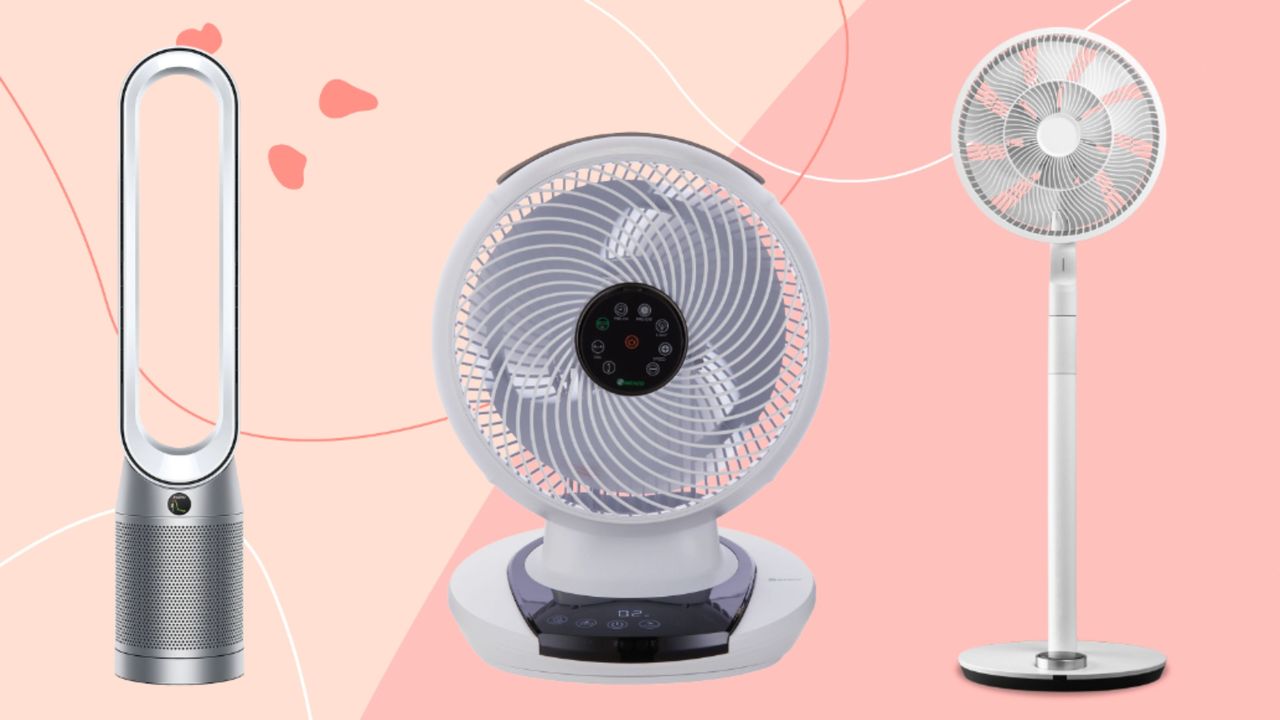

Investing in one of the best fans is no doubt a brilliant way to help you keep cool as temperatures continue to rise – and if this summer is expected to be anything like last year's, buying one while it's early is something you'll thank your future self for.
Although a fan won't dramatically reduce the temperature of a room in the same way that one of the best portable air conditioners will, by moving the air within a room and keeping that airflow circulating, the breeze a fan creates will cool your skin and make hot and humid conditions far more bearable.
However, like most things in life, when it comes to choosing the best fan for cooling you down fast, you tend to get what you pay for. A budget fan will help to create a breeze, but the downsides are likely to be that dreaded drone-like noise and a lack of functionality. Should you choose to invest a little more, you can get powerful cooling performance alongside virtually silent operation, plus a whole host of added benefits such as remote control operation, smart home compatibility, cordless design, and more.
To help you make the best choice for your home, we've rounded up the best fans on the market, trying and testing bestselling options from market leaders Meaco, Duux, and Dyson, as well as affordable options from Amazon and more. We've rated each fan for cooling performance, noise, ease of use, assembly, and energy efficiency to help you find the right cooling fan for your budget.
Quick list
Short on time? This quick list is an overview of the very best fans currently available on the market. You'll find more information on each fan and why our team of expert testers recommend it if you keep scrolling.
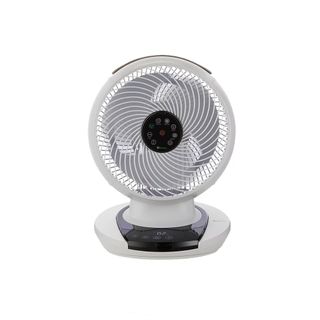
Best fan overall
Powerful, quiet, energy-efficient, and easy to use, the MeacoFan 1056 Air Circulator requires no self-assembly and is compact and portable, making it our top choice for the best fan you can buy.
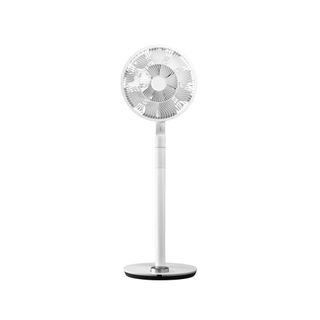
Best fan for bedroom
The quietest fan we've tested, the Duux Whisper Flex Ultimate Fan really is whisper quiet, making it the best fan for the bedroom. It's an investment, but its also wireless, Smart, and height-adjustable.
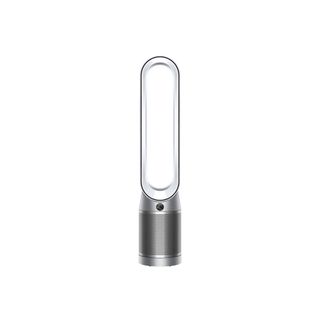
Best bladeless fan
If you want a powerful fan that works to effectively keep you cool and also looks stylish, this Dyson model is the ideal buy. It also helps with air quality issues, being a fantastic aid for the stifling summer heat.
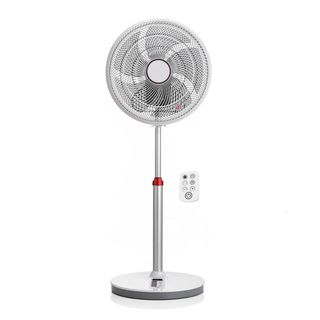
Best energy-efficient fan
Using just 1-18 watts of energy to run, this is the most energy-efficient fan we've tested, costing well under 1p per hour at current prices. It's large and not the most portable, but it's easy to set up, simple to use, quiet, and offers powerful performance alongside a 'natural wind' mode that our reviewer loved.
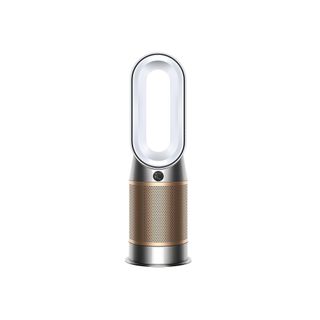
Best fan and air purifier
If you're in the market for a fan and air purifier combo, this versatile appliance offers 3-in-1 functionality whilst also being a helpful heatwave companion. Mind you though, it is quite the investment and is best suited for those looking for an air purifier first and a fan second.
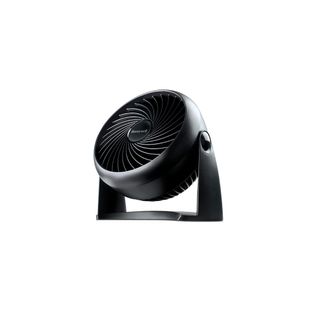
Best affordable fan
The Honeywell Turbo Force Power Fan is one of the cheapest fans out there, which is no doubt why it's one of Amazon's bestselling fans. It's basic and noisier than we'd like, but that price tag is hard to beat.
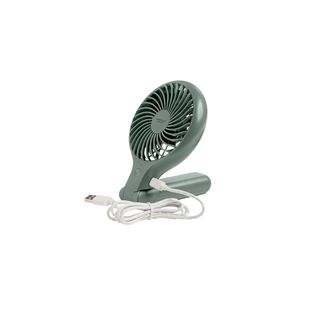
Best handheld fan
Available in several fun colourways, this versatile John Lewis & Partners handheld fan is ideal for staying cool on the move. Plus, it transforms into a compact desk or table fan once you reach your destination.
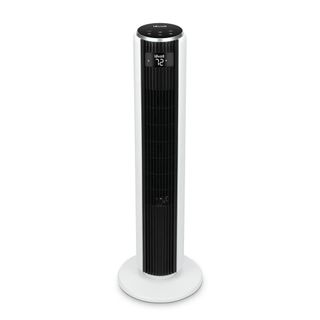
Best tower fan
With hardly any set-up at all, the Levoit Classic 36-inch tower fan is super quiet and is easy to keep clean. We love its advanced sleep mode which adjusts the fan speed based on your stages of sleep, making for a comfortable night's kip. It's also temperature responsive, and automatically adjusts the speed based on the room temperature.
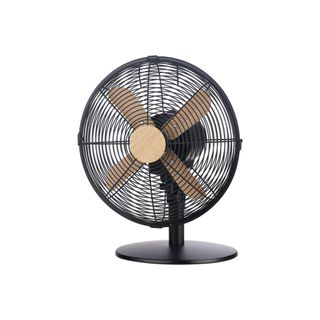
Best simple fan
Easy to use and stylish, this desk fan will help keep you cool without having to worry about all the extra bells and whistles. It's also available in a few colourways to match whatever your setup is.
Best fans
Why you can trust Ideal Home
Best fan overall
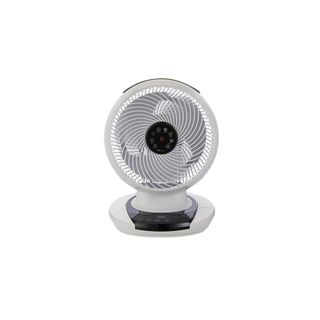

Specifications
Reasons to buy
Reasons to avoid
If you're looking to invest in a fan that really does the business, then it's hard to fault the MeacoFan 1056 Air Circulator. Whilst it's not cheap, it delivers powerful, reliable, energy-efficient and user-friendly performance for its mid-range price point.
This option offers 12 speed settings, and with its ability to move 1056 cubic metres of air per hour, it's the most powerful fan in our round-up. As it's a fan's ability to move the air that results in its cooling powers, it's no surprise that the MeacoFan 1056 Air Circulator also did the best job of all the fans we've put through the Ideal Home testing process at cooling us down. Even more impressive is the fact it delivers such power whilst remaining very energy-efficient, using just 9.5-23.5W.
What's more, this fan's multi-directional oscillation means it's not just the person sitting directly in front of the fan who benefits from its temperature-reducing powers. A 60° vertical swing and 80° horizontal swing can be combined into a multi-directional oscillation that smoothly bounces air off walls, ceilings, and surfaces to circulate air and cool the whole room rather than just one area.
Thanks to its DC motor – part of the reason this fan requires a little more investment – it also delivers that cooling airflow almost silently. Whilst it can't quite beat the Duux Whisper Flex Ultimate Fan on the 'virtually silent' front, it comes very close, especially when you consider what powerful airflow this fan can dish out. There's no hint of the dreaded droning noise that's associated with most fans, instead the only noise is of gushing air.
Better still, there's no self-assembly required with the MeacoFan 1056 Air Circulator – a surprising rarity amongst the fans we've tested, and a great plus point compared to faffing around with assembly in the middle of a heatwave. Its controls are very easy to use, there's a handy remote control, an on and off timer, and ECO mode which automatically shifts the fan speed depending on the temperature registered on the fan's in-built sensor.
All in all, whilst it may cost significantly more than a budget fan, the MeacoFan 1056 Air Circulator offers so many added extras that it's definitely our first choice when it comes to beating the heat.
Read our full MeacoFan 1056 Air Circulator review for more detail.
Best fan for bedroom


Specifications
Reasons to buy
Reasons to avoid
Why should you invest in one of the most expensive fans in our round-up? Because the Duux Whisper really does live up to its name. It's the quietest fan we've tested and virtually silent on its lowest settings. This makes it the perfect fan for the bedroom, and, even on its most powerful settings with its 13-50 dB noise levels it remains the quietest fan we've come across.
Thanks to its rechargeable battery pack, this fan is also one of the few models that can be operated cordlessly. Yes, regular recharging of the battery pack is a little annoying, but being able to place the fan anywhere you want without being tied to a power socket or having to negotiate the trip hazard of extension leads is a real boon.
The 'natural wind' mode is also a delight. This functionality mimics the subtle variation in speed of a natural breeze, and although it may sound trivial, if you're sat directly in front of the fan attempting to stay cool then the variation in airflow feels far less tiring against your skin than a constant blast.
Despite its high price tag, this fan also offers better energy efficiency than many cheaper models over the long run. The affordable Honeywell Turbo Force Power Fan retails at under £25 but uses 40W of power to run compared to the Duux Whisper Flex Ultimate Fan's 3-32W.
There are downsides beyond its price point; namely the fact that this fan requires self-assembly – you'll only have to do it once, but if you're already a little hot and bothered from the heat then it's a bit of an annoyance. And, unlike the MeacoFan 1056 Air Circulator which excels at simplicity of use, this Duux fan really has little too much functionality – does anyone really need 30 speed settings? – and its awkward controls make it a faff to operate at times. Although it does offer Smart functionality when connected to WiFi if you're keen to connect a fan to your Google Home hub or Alexa.
Really though, this fan is all about the noise, or lack thereof. If you're looking for the quietest fan out there, we think this is it.
Read our full Duux Whisper Flex Ultimate Fan review for more detail.
Best bladeless fan
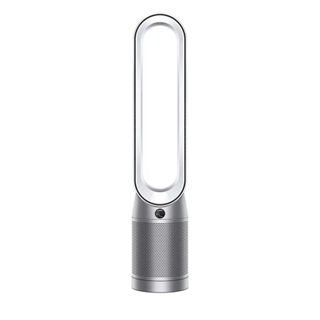

Specifications
Reasons to buy
Reasons to avoid
If you're looking for the crème de la crème of the fan world, then a Dyson bladeless fan is perhaps the most aspirational buy. Well-executed design, innovative oh-so-stylish bladeless design, and powerful multifunctional performance mean a Dyson fan easily stands out from the crowd.
However, even if you have the budget for a Dyson fan's eye-watering price tag (prices start from £399.99 and increase to £699.99, although you can sometimes make savings with Dyson discount codes), deciphering which Dyson fan is the right one for you from the brand's extensive and bewilderingly-titled product range is a feat in itself. That's because Dyson doesn't actually make a standalone fan. Instead, the fan element is almost incidental, combined with 2-in-1 or 3-in-1 appliances more focused on air purification, humidifying, or heating. In this case, the Dyson Purifier Cool Autoreact not only cools but also helps with air quality issues.
Our Kitchen Appliances Editor, Molly Cleary, found that it was a fantastic sleep aid for those especially hot nights and its air-purifying functions were perfect for tackling the often humid, stifling feeling that accompanies British summer and making for a more comfortable home. However, it is quite an investment and if you don't need the extra air treatment functions, there are plenty of other more affordable options in this guide that are just as good if you can't decide whether a Dyson fan is worth it.
Read our full Dyson Purifier Cool Autoreact fan review for more detail.
Best energy-efficient fan


Specifications
Reasons to buy
Reasons to avoid
The EcoAir Kinetic Fan is a robust and well-built fan that offers powerful performance, relatively simple assembly, straightforward and easy-to-use controls, quiet operation, and best-in-class energy efficiency.
Although its DC motor means a more expensive initial outlay, as a result, the EcoAir Kinetic uses just 1-18 watts of energy to run, making this the most affordable fan we've tested in terms of running costs.
And whilst our reviewer found the Duux Whisper Flex Ultimate Fan just pipped the EcoAir to the post in the 'virtually silent' stakes, this fan is still super quiet compared to most. Plus, it's powerful, with the ability to circulate up to 3264 m³/of air per hour.
The EcoAir Kinetic's downsides are its size, which means it's not the best fit for a small home and can make storage a struggle if you're not blessed with a garage to stash it out of sight when it's not in use. It's also not the most portable fan in our round-up, weighing in at 5kg, the heaviest of all the fans we've tested. Our reviewer also wasn't entirely sold on its slightly dated appearance, although they were impressed by its build quality.
However, it's a solid performer, its low energy consumption is very impressive, and it's one of the simplest fans to operate at its level of performance, and – when temperatures rise and patience gets frayed as a result – that simplicity could well be worth its weight in gold.
Read our full EcoAir Kinetic Fan review for more detail.
Best fan and air purifier
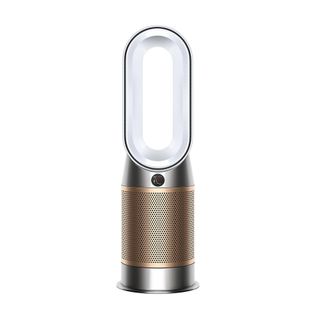

5. Dyson Purifier Hot+Cool™ Formaldehyde HP09 purifying fan heater
Our expert review:
Specifications
Reasons to buy
Reasons to avoid
The Dyson Purifier Hot+Cool HP09 Formaldehyde is such a 3-in-1 beast, combining a fan, air purifier, and heater into one uber-stylish package. In our opinion, it's perhaps the most versatile of all the Dyson fans, offering functionality that best suits British homes and will offer useful year-round use.
To make the most of its features, our tester found it's best to employ 'continuous monitoring' and 'auto' mode, whereby the purifying fan heater will continuously monitor air quality, temperature, and humidity information, display results on the LCD screen and in the Dyson Link Smart app, and on-board sensors will adjust the settings of the machine accordingly.
It's impressive stuff, but if you purely want a fan that performs well, then in our opinion, the Dyson Pure Hot+Cool HP09 Formaldehyde is an investment you don't need to make. Meaco and Duux offer fans with comparable cooling effects for considerably less cash, but if you're also considering investing in an air purifier, and you have the budget for a Dyson fan's super-cool good looks, this is a stylish investment you may be happy to make.
Read our full Dyson Purifier Hot+Cool™ Formaldehyde HP09 Purifying Fan Heater review for more detail.
Best affordable fan

Specifications
Reasons to buy
Reasons to avoid
The Honeywell Turbo Force Power Fan is one of the cheapest fans we've reviewed, which is no doubt why it's one of Amazon's bestselling fans. In fact, this budget fan has racked up over 20,000 ratings, with Amazon shoppers giving it an average of 4.5 out of 5 stars.
However, there's rarely a bargain without a catch, and the downside to the Honeywell Turbo Force Power Fan's affordable price point is its intrusive noise and limited functionality.
For some, its budget price tag will be worth putting up with the increased noise levels – this is a fan that perfectly illustrates the dreaded droning noise that most of us associate with a bog standard fan and soon became tiring to the point of us turning it off long before we'd cooled down in our testing – for others the investment in a quieter fan, like the top-of-the-range MeacoFan 1056 Air Circulator or Duux Whisper Flex Ultimate Fan will be worth its weight in gold.
It's also not the coolest fan out there, the MeacoFan 1056 Air Circulator, Duux Whisper Flex Ultimate Fan, and EcoAir Kinetic Ultra Silent Air Circulation DC Fan all deliver a more powerful, and therefore cooler, airflow. And it lacks functionality. There are just three speed settings, and there's definitely no automated oscillation or 'natural wind' mode here, although you can manually tilt the fan through 90˚ up-down.
The Honeywell Turbo Force Power Fan is basic in all senses of the word, however, that's also part of its appeal. There's no self-assembly to do, and no faffing with bloated control options, its manual control button couldn't be simpler to adjust, even if it feels a bit cheap.
Ultimately, this fan is all about the price point. You can generally pick up the Honeywell Turbo Force Power Fan for under £30 which makes it a very cheap option, as long as none of its downsides are deal breakers for you.
Read our full Honeywell Turbo Force Power Fan review for more detail.
Best handheld fan


7. John Lewis & Partners Handheld and Foldable Desk Fan
Our expert review:
Specifications
Reasons to buy
Reasons to avoid
As the weather heats up, we think this super cute and super affordable handheld fan from John Lewis & Partners is going to become your new best friend.
This versatile handheld fan is perfect for staying cool on the go, with its compact design easily slipping into a bag and making it the ideal companion for any commute or adventure away from the air con. Even better, the handle cleverly incorporates a fold-out stand, so it can be set up hands-free on your desk or table once you reach your final destination.
The fan comes with a rechargeable battery and charging cable included and can be fully charged in around 5 hours. Handily the charging cable also plugs into a standard USB port, so it can also be recharged via your laptop. We found battery life to be great, with the fan able to operate for approximately 9 hours on low speed, 6 hours on medium speed, and 4 hours on high speed, and it was surprisingly quiet for a bladed design.
Each year John Lewis & Partners launches the fan in a new set of shades – this year white, sage green, orange, and navy – and unsurprisingly, each year they sell out in record time as temperatures rise. We thoroughly recommend you beat the rush and snap yours up now whilst they're still in stock – after all, there's a good reason most of the Ideal Home team now won't leave the house one!
Best tower fan
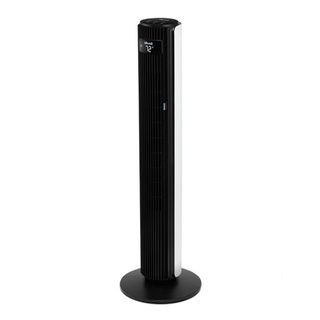
8. Levoit Classic 36-Inch Tower Fan
Our expert review:
Specifications
Reasons to buy
Reasons to avoid
We have a review of the Levoit Classic 36-inch tower fan in the works, but we included it in this list because by all accounts it’s a good price and regularly gets good reviews from verified purchasers across a multitude of websites.
With its included remote control, you can control your fan setting at the touch of a button which is great for keeping our Senior Digital Editor, Jenny, cool overnight without her having to get out of bed. Plus it features an Advanced Sleep Mode which turns off display lights and slowly adjusts the fan speed based on your stages of sleep.
Its 90-degree oscillation will make it easy for everyone to get a turn and with its five fan speed options, it's temperature responsive, which means it automatically adjusts its speed based on the room temperature. So, for example, if a room is significantly stuffy you'll get a blast of cool air at a maximum speed of 25ft/s.
And if you're wondering if it's quiet, we can confirm it really is and it has been certified ultra-quiet by QuietMark, so there's no need for earplugs overnight.
Set up is super easy too. Well, technically, there isn't much setup at all. Just snap the base pieces together, connect them to the unit and it's good to go. This makes it super easy to clean as you can simply remove and wash the back cover to keep it dust-free.
Best simple fan

Specifications
Reasons to buy
Reasons to avoid
The Russell Hobbs 12” Scandi Desk Fan takes the standard desk fan and gives it a simple yet stylish makeover via three understated colourways – white, grey and black – and some Scandinavian-style oak-effect detailing.
Thanks to those simple yet effective design touches this desk fan certainly looks a lot nicer in the home office than most budget desk fans, and, at around the £50 mark, it's also reasonably affordable. Plus, if it’s not your WFH set-up that needs cooling down to prevent you from getting hot and bothered on work calls, then the collection also includes the Russell Hobbs 16" Scandi Pedestal Fan and the Russell Hobbs 12” Scandi Floor Fan.
Beyond that, this is a fairly basic fan that doesn't offer a lot in terms of functionality. There are just three-speed settings and a 90˚ left-right oscillation, however, the lack of bells and whistles could be a plus point for many who prefer the simplicity of manual controls over digital displays and Smart technology.
In our tests, we found the unexpected self-assembly a big annoyance, but as long as you're prepared for it and have the dexterity to set it up, then you only have to assemble it once. Although this desk fan isn't quiet, it's also not as noisy as many fans at this price point, and the oscillation means you get a little extra bang for your buck compared to the cheaper and noisier Honeywell Turbo Force Power Fan for example.
All in all, the Russell Hobbs 12" Scandi Desk Fan looks good, isn't too expensive, and if you're not going to use it too often then it does the job of blowing air towards you during particularly hot and clammy days. If you're willing to invest more for quieter operation and better performance, then there are better fans to be found in this edit.
Read our full Russell Hobbs 12″ Scandi Desk Fan review for more detail.
How to choose the best fan for you
Although budget is a big motivator in all of our purchases, there's no denying that you generally get what you pay for, and this is especially true when shopping for one of the best fans on the market.
To help you work out where you want to invest a little more cash for better performance we've rounded up the key criteria to consider before choosing the best fan for your needs.
Type of fan
There are a whole host of fan styles to choose between, from compact handheld fans that are great for taking out and about, to desk fans that allow you to place the fan on a convenient surface (if you have the space) so that the fan blows directly at you whilst your sitting and working, and tower and pedestal fans that can be placed on the floor and are great for the side of a bed or to cool a larger area.
The type of fan that works best for your needs tends to depend on how and where you plan to use the fan, so thinking about placement before you shop can help to avoid costly mistakes.
Power source
Along with placement, it's also well worth considering what power source your fan will have access to. You can extend reach to a power socket with an extension lead if necessary, but that can mean things get in a tangle and create a trip hazard.
USB-powered fans can mean you aren't reliant on a static power source, and fans with rechargeable batteries, such as the Duux Whisper Flex Ultimate Fan, can make life far simpler if you have an open-plan layout and don't want wires crossing the room.
AC or DC motor
Unless a fan shouts about it having a DC motor, it's likely to be an AC motor in operation. That's because DC motors are significantly more expensive and so tend to only be used by manufacturers trying to make best-in-class products.
As Chris Michael, managing director of air quality specialist Meaco, says 'A DC fan is more expensive to manufacture than an AC fan but for the consumer, they are much better. A fan with a DC motor will be quieter, use less energy to produce the same results, tend to be more powerful, can offer more variation in fan speeds, and should last longer'.
Air displacement
This means how much air a fan can circulate in a given time frame, and is usually measured in m3 per hour.
Not all fans will provide this information, especially cheaper models where manufacturers know it won't be a bragging point, but if you can track down the fan's air displacement metrics in its specifications it will give you an idea of how powerful the fan is.
Energy usage
Whilst the fan itself may be cheap in the sale, it's worth considering how much it costs to run a fan before you shop.
Often more expensive fans will be equipped with better technology which means they require much less energy to run, and during a heatwave, you may want a fan running for multiple hours each day.
Checking the wattage of the fan and comparing it to other models – or reading the appliance's energy certificate if one is provided – can help to find the most energy-efficient model with the lowest running costs.
In our tests that proved to be the MeacoFan 1056 Air Circulator fan with its low 9.5-23.5W power usage.
Noise levels
In our opinion, there's nothing worse than the dreaded drone of a noisy fan on a hot day. If you opt for a cheap fan then noise is likely to be a compromise you may need to make, but if you can find a more expensive model in the sale then your ears may well thank you.
Most fans – at least those that aren't trying to hide anything! – will inform you of their noise levels in the technical specifications. This is measured in decibels and often marked dB.
The quietest fan we've tested is the Duux Whisper Flex Ultimate Fan which measures from just 13dB on its lowest speed setting to a maximum of 50dB on its highest setting. Noise can be especially important if you plan to use the fan to help you keep a bedroom cool and don't want it to disturb your sleep.
Timer
Not all fans come with a timer function, a feature that can be especially useful if you plan to use your fan at night to help you fall asleep when it's warm, but don't want it running all night.
If this is important to you, then investing a little more for this feature could be worth it for the energy you'll save.
Remote control
Again, this is a particularly useful to have if you plan ti use your fan during the night as it means you don't have to get out of bed to adjust the fan speed, direction, or to turn it on or off.
Oscillation
This is the back-and-forth or up-and-down motion that casts the airflow around the room, helping to share the cooling breeze around rather than focusing it directly on one person.
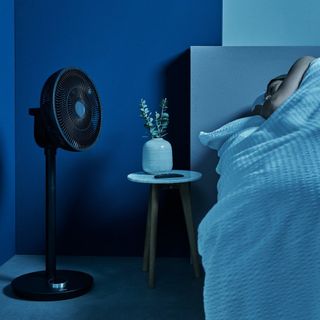
FAQs
Do fans actually cool the air?
Even the best fans won't physically reduce the temperature of a room. You'll need one of the best portable air conditioners for that. However, our review team was still highly impressed by the cooling effect that the best fans delivered.
We've probably all encountered the welcome cooling effects of a breeze on a stiflingly hot day – even though the temperature hasn't decreased, that breeze on your skin instantly makes the heat more bearable and reduces the 'claustrophobic' feeling that a hot and humid day can invoke. The movement of air across your skin also helps moisture and 'stickiness' to evaporate, creating a not-to-be-underestimated cooling sensation.
A good fan can recreate the powers of nature, delivering this same 'cooling' airflow indoors, and making hot and humid conditions far more bearable.
Gentler than the icy chill of a portable air conditioner, using far less energy, and costing less to run, a fan is a very useful heatwave essential that really does make a difference to wellbeing in the hotter months.
Holly Male, Brand Manager at Duux adds, 'To keep the air cool, elevate the fan (if possible) to ensure better air circulation, especially in larger rooms and let the fan oscillate upwards to circulate air more effectively throughout the room.'
'In larger spaces, use multiple fans in larger spaces to create cross-ventilation and to improve overall air movement and cooling efficiency.'
Which is the quietest fan?
In our tests, the Duux Whisper Flex Ultimate Fan was by far the quietest fan we reviewed, followed by the MeacoFan 1056 Air Circulator.
The Duux Whisper Flex Ultimate Fan really is as quiet as its name suggests on its lowest settings, delivering cooling airflow with just 13dB of noise.
We thoroughly recommend it as the best bedroom fan you can invest in, as on those low-speed settings it's virtually silent so won't disturb even the lightest of sleepers. Noise levels do increase as you reach the top end of its 32-speed settings, whereby it reaches a volume of 50dB, but it was rare we needed it on full power during our tests.
Do fans use a lot of electricity?
The amount of electricity a fan uses depends a lot on the model you invest in. A fan with an AC motor will be cheaper upfront to purchase but generally uses more electricity. A fan with a DC motor will be more of an initial outlay, but running costs will generally be lower.
The two most energy-efficient fans we've tested are the Duux Whisper Flex Ultimate Fan which uses just 3 watts of power on its lowest settings, rising to 32 watts on its highest settings, and the MeacoFan 1056 Air Circulator, which uses 9.5 watts on low and just 23.5 watts on its super-powerful highest setting thanks to its DC motor.
Pretty much all fans will use a lot less electricity than a power-hungry portable air conditioner, and cost less to purchase upfront, so they're a good value way to stay cool in hot temperatures.
Duux's brand manager, Holly Male shares her top tips to maximise energy efficiency.
- 'Use oscillation: Use an oscillation function to distribute cool air more evenly throughout the room, reducing the need to run the fan at higher speeds,' explains Holly Male, Brand Manager at Duux.
- 'Lower fan speed: Operate the fan at lower speeds whenever possible, as higher speeds consume more energy.'
- 'Combine with natural ventilation: Use the fan in conjunction with open windows or doors to enhance airflow and cooling without relying solely on the fan.'
- 'Strategic placement: Position the fan in a way that maximises air circulation in the room, such as near a window or in a corner.'
- 'Routine maintenance: Keep the fan clean and free from dust to ensure it runs efficiently. A clean fan works better and uses less energy.'
- 'Timer function: Use the timer function to automatically turn off the fan after a set period, preventing unnecessary energy usage.'
What is the best way to use a fan to cool a room?
We asked Holly Male at Duux for her advice.
'Place the fan near windows or doorways to pull in cooler air from outside and turn on the fan 10-15 minutes before you enter the room to pre-cool the space, making it comfortable when you arrive,' she advises.
'If it's hot outside, position the fan to blow air outwards, pushing hot air out of the room.'
How we test
You'll find full details of the Ideal Home review process on our how we test page.
Our team of reviewers tested a host of the best fans on the market to compile this guide. We compared assembly and set-up, ease of use, cooling powers, noise levels, and any extra functions each fan offered to find the best fan for the bedroom, the most affordable fan, the quietest fan, and the most powerful.
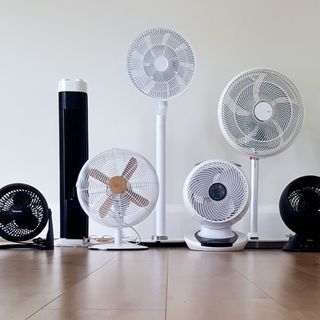
If there are any products we haven't managed to test in person, or the product didn't achieve over 4 out of 5 stars, then they won't have an Ideal Home Approved badge.
However, you can rest assured we've done thorough research on their technical specifications and read multiple happy – and not-so-happy – customer reviews to narrow down our suggestions to only the best-in-class.
Get the Ideal Home Newsletter
Sign up to our newsletter for style and decor inspiration, house makeovers, project advice and more.

Amy is Ideal Home’s Sleep Editor and the Ideal Home Certified Expert on Sleep. She's spent the last four years researching and writing about what makes for the best night’s sleep during the day and testing out sleep products to find the best-in-class by night. So far she’s clocked up over 10,000 hours of pillow, duvet, and mattress testing experience.
Our go-to for all things sleep-related, she’s slept on and under bestselling products from Simba, Emma, Hypnos, Tempur, Silentnight, Panda, and many many more.
As a hot sleeper, Amy is always on the lookout for the most breathable bedding, but she also leads a wider team of testers to ensure our product testing encompasses both hot sleepers, cold sleepers, front sleepers, back sleepers, side sleepers, and everything in-between.
- Jullia JosonJunior Writer
- Jenny McFarlaneSenior Digital Editor
-
 Can you plant new roses in an old rose bed? It isn't the best idea — but here's what you can do to reduce the risk of replant disease
Can you plant new roses in an old rose bed? It isn't the best idea — but here's what you can do to reduce the risk of replant diseaseWhy some experts warn against planting new roses in an old rose bed
By Sophie King
-
 Jamie Oliver's new tableware collection is beautiful and selling fast – these are the things to shop before they sell out
Jamie Oliver's new tableware collection is beautiful and selling fast – these are the things to shop before they sell outFeaturing on-trend colours galore
By Molly Cleary
-
 How to make your ceiling more attractive – 7 ways to turn the neglected fifth wall into a beautiful feature
How to make your ceiling more attractive – 7 ways to turn the neglected fifth wall into a beautiful featureAre you forgetting to decorate your ceiling? You really shouldn't
By Sara Hesikova